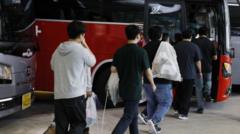What Happened When US Officers Threatened South Korean Engineers?

Published: 2025-09-16 22:30:51 | Category: technology
This article delves into the recent immigration raid in Georgia, where over 300 South Korean workers were detained by US immigration enforcement officers. Initially meant to support the construction of an electric car battery plant, these workers found themselves caught up in a shocking enforcement operation that raised serious questions about visa regulations and human rights. The aftermath has left many feeling shaken and uncertain about their future in the US.
Last updated: 06 October 2023 (BST)
Key Takeaways
- Over 300 South Korean workers were detained in an immigration raid in Georgia.
- The workers were in the US on various visas, primarily to assist in building an electric car battery plant.
- US immigration officials initially claimed the workers were in the country illegally but later allowed them to leave voluntarily.
- The raid has raised concerns about human rights violations and strained US-South Korea relations.
- Many detained workers are now struggling with the psychological effects of their experience.
The Context of the Raid
The raid occurred as part of a broader immigration enforcement strategy during the Trump administration, which aimed to crack down on undocumented immigrants. However, the targeting of foreign workers who were legally in the US has sparked outrage and confusion. Many of these workers were employed by South Korean firms, Hyundai and LG, which have been instrumental in the US's push for foreign investment in the manufacturing sector.
The Workers' Perspective
Youngjin, one of the detained workers, described the terrifying moment armed agents burst into his office. Despite his short-term visa status, he felt safe until that point. Similarly, Chul-yong recounted the chaos and fear when agents began arresting workers, leading to a sense of disbelief. "We just came out for a brief break," he remembered, highlighting the unexpected nature of the raid.
Impact on US-South Korea Relations
This incident has significant implications for diplomatic relations between the US and South Korea. Traditionally viewed as close allies, the two countries' partnership appears strained following the raid. The South Korean government has expressed its concerns, with officials now investigating potential human rights violations by US authorities during the operation. The swift agreement allowing workers to leave voluntarily without penalties indicates that both sides recognised the potential for diplomatic fallout.
Legal and Visa Implications
The raid has prompted discussions about visa regulations and the legal status of the workers involved. Many detained individuals believed they were compliant with US immigration laws. For instance, Mr Kim argued that his B-1 visa permitted him to work in the factory. The uncertainty surrounding the legality of their work has left many feeling vulnerable and confused.
Conditions in Detention
Those detained described harrowing conditions at the Folkston ICE Processing Center. Youngjin recounted a room filled with 60-70 people, where fear and uncertainty prevailed. He recalled the freezing temperatures and lack of blankets, leading to panic and distress among the detainees. Chul-yong noted that the basic amenities were lacking, with detainees forced to find makeshift sleeping arrangements due to limited space.
Psychological Impact of the Experience
The psychological toll of the experience has been profound for many workers. Youngjin shared that he felt hollow upon reuniting with his family, only truly processing the trauma when he returned home. Chul-yong echoed these sentiments, revealing that even smiling upon arrival home masked deeper feelings of sadness and fear. The lingering effects of the trauma have made daily life challenging for both men, highlighting the need for mental health support for those affected.
What Happens Next?
The future remains uncertain for these workers, many of whom are reconsidering their options regarding returning to the US. While some may feel compelled to continue their work due to financial obligations, the fear of a similar experience may deter others. Youngjin's trust in the US as a reliable partner has been shaken, and many workers are grappling with the psychological ramifications of their detention.
The Role of Legal Support
Support from legal representatives and consular staff has been crucial in navigating the aftermath of the raid. Many workers were unaware of their rights prior to speaking with lawyers, and this information was vital in securing their release. The South Korean government’s involvement in addressing the situation reflects a commitment to protecting its citizens abroad and ensuring their rights are upheld.
Conclusion
The immigration raid in Georgia has exposed vulnerabilities in the US immigration system, particularly regarding the treatment of foreign workers. As the South Korean government investigates the incident and its implications, the long-term effects on workers like Youngjin and Chul-yong remain to be seen. Their stories serve as a poignant reminder of the human cost of immigration enforcement and the need for clearer policies that protect all workers.
As the situation evolves, it raises important questions about the balance between immigration enforcement and the rights of legitimate workers. How can the US ensure that its immigration policies do not undermine the trust of foreign partners? #ImmigrationPolicy #HumanRights #USKoreaRelations
FAQs
What led to the immigration raid in Georgia?
The immigration raid in Georgia was part of a broader enforcement strategy during the Trump administration, which sought to crack down on undocumented immigrants. It unexpectedly targeted foreign workers with valid visas who were helping build a battery plant.
How many workers were detained during the raid?
Over 300 South Korean workers were detained in the immigration raid, making it one of the largest enforcement operations during that period.
What were the living conditions like in detention?
Conditions in detention were reported to be harsh, with detainees experiencing freezing temperatures, inadequate sleeping arrangements, and limited access to necessities like food and clean water.
What is the status of the detained workers now?
Most of the detained workers were released voluntarily without penalties after negotiations between the South Korean government and US authorities, but many are struggling with the psychological aftermath of their experience.
How has the incident affected US-South Korea relations?
The raid has strained US-South Korea relations, traditionally close allies, leading to investigations into potential human rights violations and a reassessment of diplomatic ties.
What support is available for workers affected by the raid?
Legal support and consular assistance have been vital for the detained workers, helping them navigate their rights and secure their release. Ongoing mental health support is also crucial for those affected by the trauma of detention.



